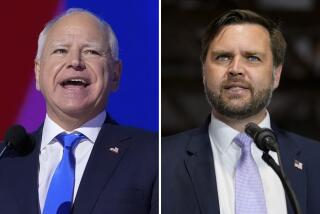The YouTube debate
- Share via
ON MONDAY, CNN plans to host a debate in which Democratic presidential candidates will answer questions sent to YouTube.com, a popular video site. If it’s a gimmick, it’s one the public has embraced. So far, people have submitted more than 1,500 video queries, many about problems faced by their families or friends.
Predictably, most of the videos bear little resemblance to network television. The unvarnished look, however, is part of the charm. The point isn’t to replicate the look and feel of past debates, it’s to use a different medium to create something new and, potentially, more powerful. The best of the submissions give abstract policy issues a human face, as when a father shows pictures of his young Marine son and asks, “Please tell me what specific steps you will take in order to ensure Middle East stability so that my son will not have to go back.” Another example is the mother who offers a slide show of her wheelchair-bound, mentally disabled daughter and asks how the candidates would address the shortage of residential treatment facilities and nurses for home healthcare.
Some of the videographers have taken advantage of editing software to blend in graphics to amplify their points. But while the YouTubers are probably more tech-savvy than the average voter, the questions they ask seem representative of most Americans’ concerns. The most popular topics aren’t geeky issues like high-speed Internet access and Net neutrality, but mainstream issues such as Iraq, the United States’ image abroad, education, healthcare, energy policy and climate change.
Granted, there are some signs of infiltration by political professionals and lobbying groups. Maybe it’s just a matter of time before the political establishment learns how to dominate this kind of event too. But one of the most refreshing aspects of the submissions is the blunt tone and the eagerness to ask questions that politicians are rarely willing to answer. CNN producers will ultimately decide which of the submissions to put to the candidates on Monday, but with any luck, they’ll pick the ones that their own reporters couldn’t, or wouldn’t, have asked.
More to Read
Get the L.A. Times Politics newsletter
Deeply reported insights into legislation, politics and policy from Sacramento, Washington and beyond. In your inbox three times per week.
You may occasionally receive promotional content from the Los Angeles Times.










